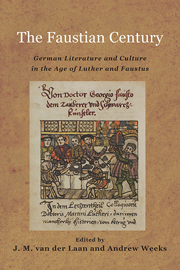Book contents
- Frontmatter
- Contents
- List of Illustrations
- Acknowledgments
- Introduction: Faust Scholarship and the Project at Hand
- 1 The German Faustian Century
- 2 Faustus of the Sixteenth Century: His Life, Legend, and Myth
- 3 Cornelius Agrippa's Double Presence in the Faustian Century
- 4 Converging Magical Legends: Faustus, Paracelsus, and Trithemius
- 5 Faust from Cipher to Sign and Pious to Profane
- 6 The Aesthetics of the 1587 Spies Historia von D. Johann Fausten
- 7 The Lutheran Faust: Repentance in the Augsburg Confession and the German Faustbuch
- 8 Marriage in the Historia von D. Johann Fausten (1587)
- 9 Antiauthoritarianism and the Problem of Knowledge in the Faustbuch
- 10 Exploring the “Three-Fold World”: Faust as Alchemist, Astrologer, and Magician
- 11 The Devil in the Early Modern World and in Sixteenth-Century German Devil Literature
- 12 Encounters with “Schwarz-Hans”: Jacob Böhme and the Literature of the Devil in the Sixteenth Century
- 13 D. Johann Faust and the Cannibals: Geographic Horizons in the Sixteenth Century
- A Sixteenth-Century Chronology of Significant References to Faust with Parallel World Events
- Select Bibliography
- Notes on the Contributors
- Index
3 - Cornelius Agrippa's Double Presence in the Faustian Century
Published online by Cambridge University Press: 05 May 2013
- Frontmatter
- Contents
- List of Illustrations
- Acknowledgments
- Introduction: Faust Scholarship and the Project at Hand
- 1 The German Faustian Century
- 2 Faustus of the Sixteenth Century: His Life, Legend, and Myth
- 3 Cornelius Agrippa's Double Presence in the Faustian Century
- 4 Converging Magical Legends: Faustus, Paracelsus, and Trithemius
- 5 Faust from Cipher to Sign and Pious to Profane
- 6 The Aesthetics of the 1587 Spies Historia von D. Johann Fausten
- 7 The Lutheran Faust: Repentance in the Augsburg Confession and the German Faustbuch
- 8 Marriage in the Historia von D. Johann Fausten (1587)
- 9 Antiauthoritarianism and the Problem of Knowledge in the Faustbuch
- 10 Exploring the “Three-Fold World”: Faust as Alchemist, Astrologer, and Magician
- 11 The Devil in the Early Modern World and in Sixteenth-Century German Devil Literature
- 12 Encounters with “Schwarz-Hans”: Jacob Böhme and the Literature of the Devil in the Sixteenth Century
- 13 D. Johann Faust and the Cannibals: Geographic Horizons in the Sixteenth Century
- A Sixteenth-Century Chronology of Significant References to Faust with Parallel World Events
- Select Bibliography
- Notes on the Contributors
- Index
Summary
Double Vision in the Canon of “Great Men”
The bibliothèque sainte-geneviève in Paris is not merely a great library and one of the mid-nineteenth century's architectural triumphs; it is also, like the Panthéon, which it overlooks from the north side of the Place du Panthéon, a structure visibly devoted to commemorating the illustrious dead. That commemoration, however, contains one notable error that offers a point of entry into this chapter's subject, which is the peculiarly redoubled participation of the early sixteenth-century humanist, occult philosopher, skeptic, satirist, and protofeminist Cornelius Agrippa—or Henricus Cornelius Agrippa ab Nettesheym, to give his full Latin name—in what we are calling in this book “the Faustian century.”
One aspect of that redoubled participation stems from Agrippa's place within an intellectual current of the fifteenth to early seventeenth centuries that celebrated unconstrained human capacities in a manner some twentieth-century scholars—with a nod to Goethe's Faust, no doubt, and perhaps also to Oswald Spengler's Decline of the West—identified as having “Faustian” qualities. The other has to do with Agrippa's posthumous demonization, which both paralleled and contributed to the development of the sixteenth-century legend of Faustus—a narrative that was itself shaped by wider currents of religious repression. Taken together, they point on the one hand to a road not taken in European culture, a pattern of thought and interpretation that, although influential in art and literature and viewed by some cultural historians as a defining feature of the Renaissance, nonetheless remained marginal within the major institutions of learning and, on the other hand, to the forces of repression that ensured its marginality.
- Type
- Chapter
- Information
- The Faustian CenturyGerman Literature and Culture in the Age of Luther and Faustus, pp. 67 - 92Publisher: Boydell & BrewerPrint publication year: 2013



